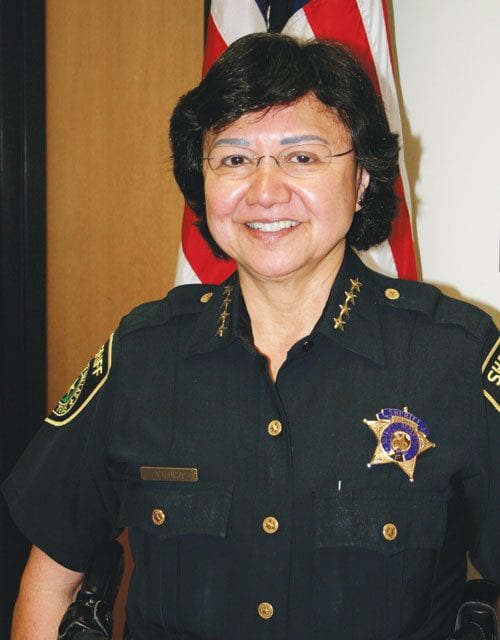Harris County Jail’s new LGBT protections were called the first in the state, but Dallas has implemented them for years

QUIET CHANGES | Dallas County Sheriff Lupe Valdez said she’s had LGBT protections in her jail since 2005. (Anna Waugh/Dallas Voice)
When the Harris County Sheriff’s Office announced a sweeping LGBT nondiscrimination and housing policy last month, it was heralded as the first of its kind in the state.
But after reviewing the policy and the one implemented by openly gay Dallas County Sheriff Lupe Valdez, the policy, while extensive, is one of many in the state.
The policy, released mid-November in conjunction with the county’s regulations required by the Prison Rape Elimination Act, provides a safe zone for better communication with the gay community, as well as housing gay inmates in homosexual tanks and allowing transgender inmates to be called by their chosen name and housed with their gender identities.
Harris County Sheriff Adrian Garcia told The Associated Press he believes the new policy is one of the most comprehensive in the country. It states that “discrimination or harassment of any kind based on sexual orientation or gender identity is strictly prohibited,” and outlines how such inmates will be searched, booked and housed.
Brandon Wood, executive Director of Texas Commission on Jail Standards, said most metropolitan areas have designated housing areas for the LGBT community, but the protections aren’t required by the commission, which requires jails meet minimum jail requirements. He said many jails don’t have extensive LGBT policies.
“We do have several counties that have addressed that issue and it’s above and beyond what we require,” he said. “I think most of them have at least pieces and portions that are probably similar in nature because they do a very good job of trying to ensure the safety and security of all inmates at all times.”
Valdez told Dallas Voice that Dallas County Jail, the seventh largest in the U.S., has had separate homosexuals tanks for gay inmates since she took over as sheriff in 2005. The transgender protections took affect about two years ago, she said. Also, all classification specialists are trained on LGBT issues.
In 2009, Valdez added sexual orientation and gender identity to policies prohibiting harassment and discrimination in the sheriff’s General Orders, a policies and procedures manual for the department’s employees.
“We had it way before they did,” Valdez said about Harris County. “Just because we didn’t put it in the paper doesn’t mean we didn’t have it.”
When people get booked, Valdez said a classification specialist talks to people about their sexuality and gender identity. If transgender inmates are far along in their transition, they can be housed with their gender identity. If they don’t feel comfortable, they have the choice to be in a homosexual tank or to have a single cell.
“Some transgenders are not comfortable with gay men because they make fun of them,” Valdez said. “So gay men think they’re too butch or something so they make fun of them. We ask them if they’re comfortable going in there and, as we’re talking to them, the specialist is looking and trying to figure out if it’s OK.”
Harris County’s policy also covers intersex inmates, defined as people born with sex chromosomes or reproductive systems that are not considered standard.
Houston has the third-largest county jail in the U.S., behind Los Angeles and Chicago’s Cook County, and processes some 125,000 inmates annually. Other major jails, including those in Los Angeles, Denver and Washington, D.C., have taken similar steps to meet new federal standards for protecting inmates from sexual abuse and assault.
Garcia’s office reviewed policies in 20 other law enforcement agencies across the country, including Denver, San Francisco, Los Angeles, Miami-Dade County in Florida and Las Vegas, as well as an International Association of Chiefs of Police database. Harris County borrowed from each to come up with a policy it perceived to be more comprehensive.
A key section of the policy states that members of the transgender community will be addressed by their chosen names, even if it has not legally been changed, both when spoken to and on their identification bracelets.
Such an issue arose recently at the jail and was one of several things that prompted the department to begin its review.
That incident involved Nikki Araguz, the transgender widow of a fallen firefighter who was sentenced to 50 days in jail for stealing a Rolex watch off the wrist of a woman she met in a bar. Araguz had previously been in jail, but had been booked as Justin Purdue. Because the name Justin was attached to her fingerprints in the computer system, the officers booking her initially refused to put the name Nikki Araguz on her wristband, Bernstein said. Higher level officers in the department made “ad hoc adjustments” so Araguz’s wristband could accurately reflect her name.
Because Araguz had undergone surgery, she was housed with the women when she returned to jail. But under the new policy, even if she hadn’t had the operation she could still have been housed with the women.
Valdez said she was glad Harris County implemented an extensive LGBT policy, adding that her jail has had a similar policy in place to protect LGBT inmates. While the policies are worded differently, she said their principles are the same and “it may be two different ways of doing the same thing.”
“The end result is we need to take care of our people,” Valdez said.
This article appeared in the Dallas Voice print edition December 20, 2013.

